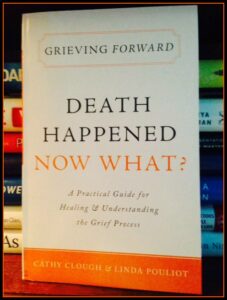We Grieve All Loss
We grieve all loss. Not just the death of a loved one. Because grief is the normal and predictable reaction to loss. That said, what is a loss for one person may not be for another person. And when we experience a loss the intensity and duration of pain and emotional upheaval varies from loss to loss and from person to person.
“Your grief is an affirmation of your ability to love and your sadness shows how important relationships are to you.” -Lindsay G. Gibson PsyD Disentangling from Emotionally Immature People
Loss And Grief Pain Are Normal
The key thing to remember is that loss and grief pain are a normal part of being human and living in this world. The problem is that we live in a culture where the expectation is to pretend that all is well when all is not well. The expectation is to stuff painful emotions and words of grief and sadness because outward expression of grief pain – Mouring – makes many people uncomfortable or it doesn’t fit in with their personal or political agenda.
What Happened to Me Can Happen to You
After a loss we are the uncomfortable in the flesh reminder that what happened to me (my loved one) can happen to you (your loved one). This is especially true after the death of a loved one. We become the billboard with flashing lights highlighting the fact that mortality is reality. That each of us has an expiration date. Other examples are after a divorce, a scary medical diagnosis, empty nest, loss of trust… See Life Events That Can Trigger Loss
However, after a loss, if we stuff our pain and tears and if we look and act normal for the people around us who are uncomfortable with any level of loss and who do not understand grief pain or how healing happens… they can go on with their life pretending that nothing bad happened – even though it did. Give yourself permission to let these people go because they really don’t care about what you are dealing with right now -and they may never understand. They only care about how they feel. The bottom line is that you need to focus on what you need to do for your healing. And if you have children the focus needs to be on helping each one of them navigate their personal healing journey.
Stuffing Painful Emotions Isn’t Healthy
The problem is that stuffing painful emotions has been scientifically linked to illness. Everything from heart disease to allergies have been connected to unresolved grief pain and emotions. And unresolved grief impacts relationships negatively. This is why it is so important for you to acknowledge what you are feeling. And to give yourself permission to work through the emotional, mental, and physical pain of grief, all the secondary loss involved, role and responsibility changes… All of the unwanted change (sometimes wanted change) related to the loss in a healthy and productive way.
When we understand what grief is and what grief does – what’s normal for grief – it’s much easier for us to navigate our personal healing journey in a healthy and productive way. Make a list of all the unwanted/wanted change that you are dealing with. This list is a reminder of just how hard you are working right now. And don’t minimize how hard that you are working right now either. After a death there is a lot to grieve and to be sad about.
Tell Your Friends What You Need
Friends and family members can’t read your mind. Tell them what you need. And you can’t read minds either. Ask friends and family members what they need. Allow yourself to cry and give friends and family members permission to cry and to grieve in their own way,too.
Become Your Own #1 Supporter
Become your own number one supporter… And learn as much as you can about what’s normal for grief. Because when we understand what’s normal for grief it’s easier to navigate our personal healing journey. Learn More. Get Your Copy Today


